The LOC Scoliosis brace is a 3D, hypercorrective, Cheneau-Gensingen derivative brace.
It is arguably the most corrective, modern scoliosis brace in the UK with clinical findings showing an average in-brace correction of 85% when worn according to the prescribed wear schedule.
The LOC Scoliosis Brace is designed to:
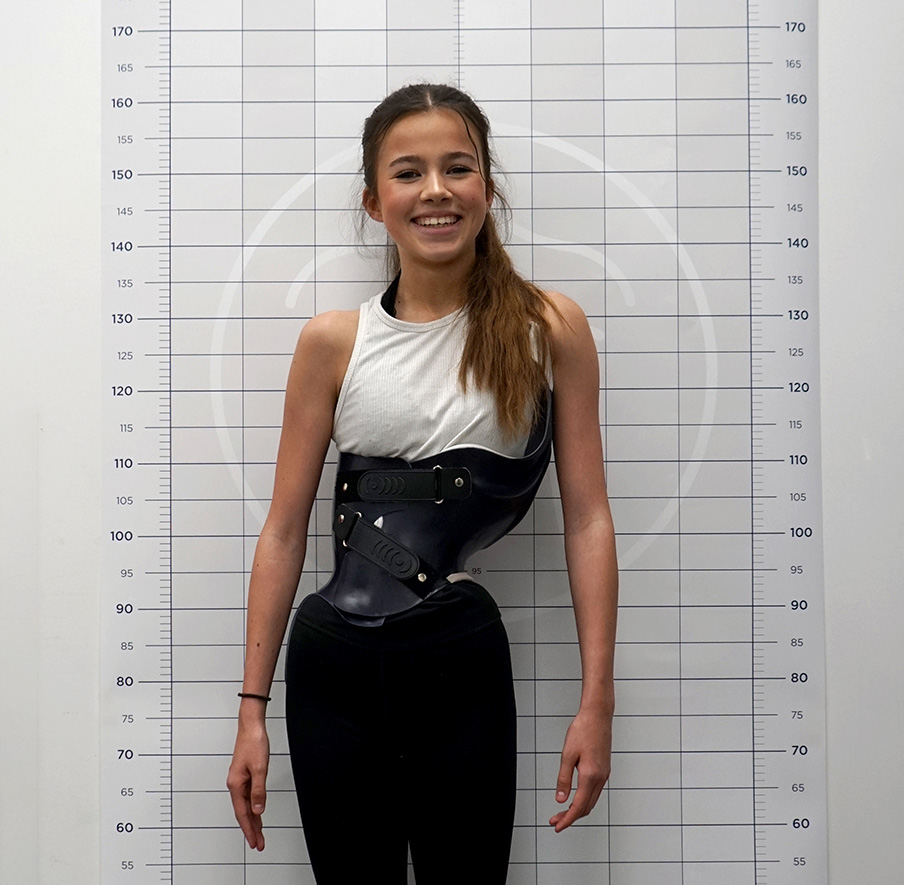
One of our patients in her bespoke LOC Scoliosis Brace
The LOC Scoliosis Brace works by applying three-dimensional corrective pressure to the scoliosis curve(s), allowing the spine to move into a more normalised position. The brace works by pushing the spine into a straighter position and opposing the forces which try to make the curve larger.
Each brace is entirely unique and tailored to the patient’s spinal curve pattern. Our brace has been fine-tuned according to feedback from our scoliosis patients and from referring spinal consultants. This is to ensure we are achieving as much skeletal correction as possible in-brace for each patient, whilst also making our brace as comfortable as possible.
Unlike traditional braces, the LOC Scoliosis Brace opens from the front, making it easier for patients to put on and take it off themselves. It is designed to be as low profile as possible, especially under clothing, while maintaining excellent in-brace correction.
The LOC Scoliosis Brace works in conjunction with specialist Schroth-based therapy to achieve maximum results. It is a full-time brace, designed to be worn 22 hours a day including nighttime.
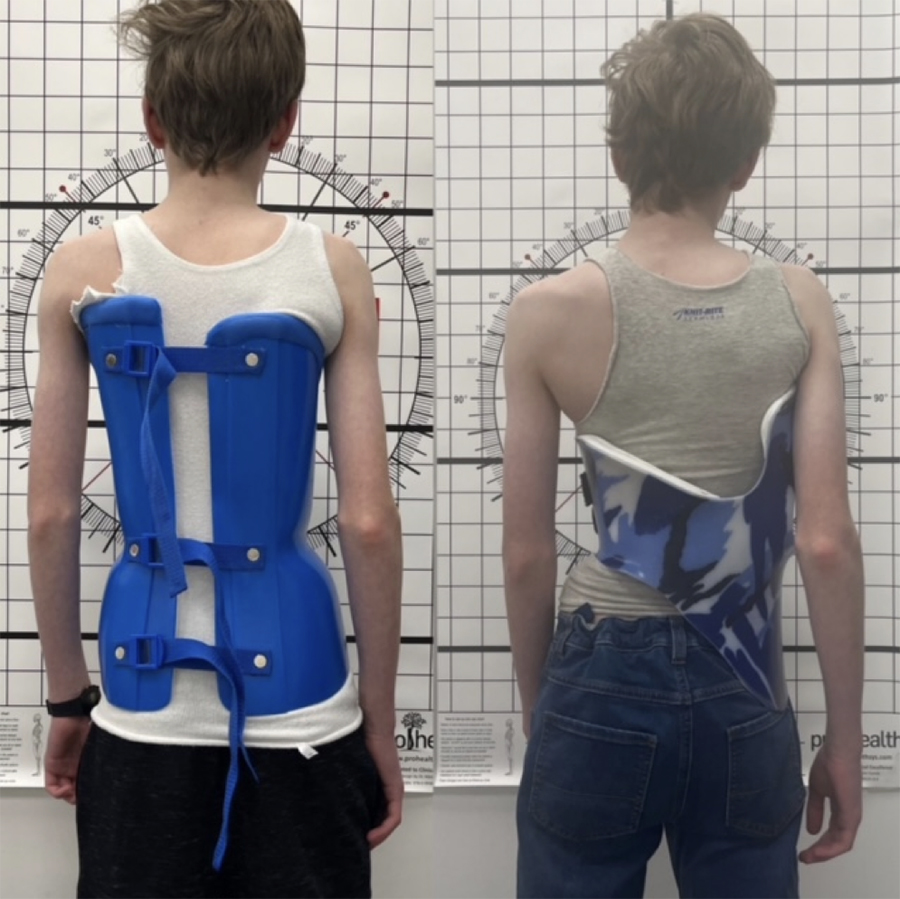
Left: Adolescent male patient wearing a traditional Boston brace. Right: a bespoke LOC Scoliosis Brace on the same patient.
The LOC Scoliosis Brace can actively reduce the curvature by loading the spinal bones three-dimensionally to change their shape (thereby reducing the Cobb angle) before growth is completed.
Because of its hypercorrective nature, it means patients typically need to wear the LOC Scoliosis brace for a shorter period of time compared to other braces. In turn, this means patients can have their scoliosis treated with minimum impact on their lives both in terms of brace wearing and disruption from school or work.
Each LOC Scoliosis Brace is entirely tailored. This means that they are smaller and less bulky than traditional braces, while using less plastic to manufacture.
We use a published risk of progression formulae in our approach to treatment, which considers a patient’s:
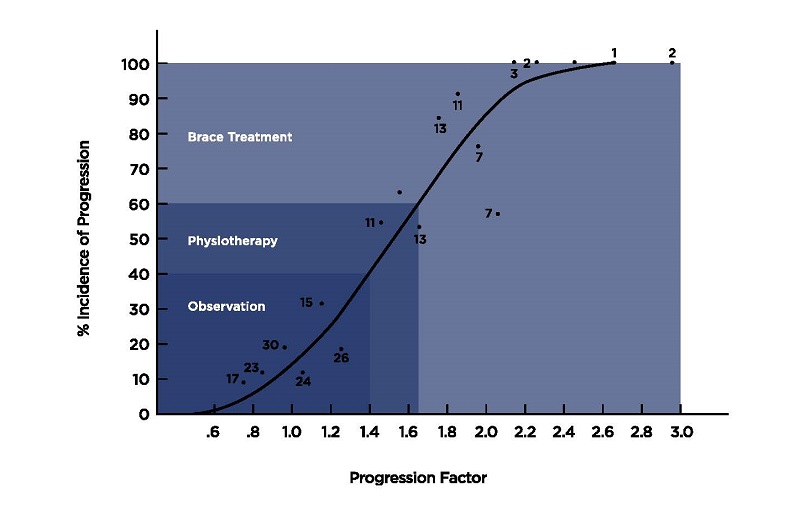
Risk of scoliosis curve progression formulae, based on a patient's age, Risser sign and the size of the presenting curve.
To improve patient compliance with the brace-wearing regime, LOC now includes an optional thermal/pressure sensor with every LOC Scoliosis brace. This approach aligns with the evidence and practices of other world-leading bracing companies.
The Hawthorne Effect is well established; demonstrating that when subjects are aware of being monitored, their compliance improves, leading to better outcomes.
The LOC Scoliosis brace is designed to be worn for 22 hours a day. Our patient data (since January 2022) indicates that adhering to this regimen results in quicker and more complete correction of a growing child's scoliosis.
An independent study by a leading spinal surgeon concluded: “Compliance in brace wear is a significant factor in the success of bracing treatment. The most compliant brace wearers achieved the best results, with the greatest curve corrections occurring in those who wore the brace the longest each day.”
The thermal/pressure sensors monitor the brace’s temperature, indicating when it is being worn. LOC will provide patients and families with reports on brace wear during reviews, facilitating informed discussions and encouraging longer wear times.
LOC is one of the most experienced private scoliosis clinics in the UK in terms of both patients treated and braces fitted. Our clinical findings show that the LOC Scoliosis brace achieves an average in-brace correction of 85% when worn according to the prescribed wear schedule. In comparison, Boston braces achieve only 50% and other asymmetric braces available in the UK achieve between 50 and 65%.
It is hypercorrective, which means that it is capable of pushing the curve(s) beyond the midline of the spine. We have had success treating both simple single and complex double curves with the brace.
While it varies from patient to patient, the LOC Scoliosis Brace offers more than 50% skeletal correction. To the extreme, we have seen corrections exceeding 100% (as below) in the LOC Scoliosis Brace, which is why these braces can be termed ‘over-corrective’.
In these instances, it is possible to proceed with reduced brace-wearing hours, or if full-time bracing is still indicated, the brace can be altered. This ‘over-correction’ gives the wearer the greatest chance at skeletal correction.
If for any reason, our clinician is not fully satisfied with the skeletal in-brace correction after receiving the x-ray, the brace will be re-modelled and re-made (free of charge) as part of a multi-colleague meeting – this ensures all our patients are in gold standard braces, whilst not losing any possible corrective time in-brace.
See more case studies of hypercorrection we’ve achieved with the LOC scoliosis brace
Examples of hyper correction that have been achieved in the LOC Scoliosis Brace:
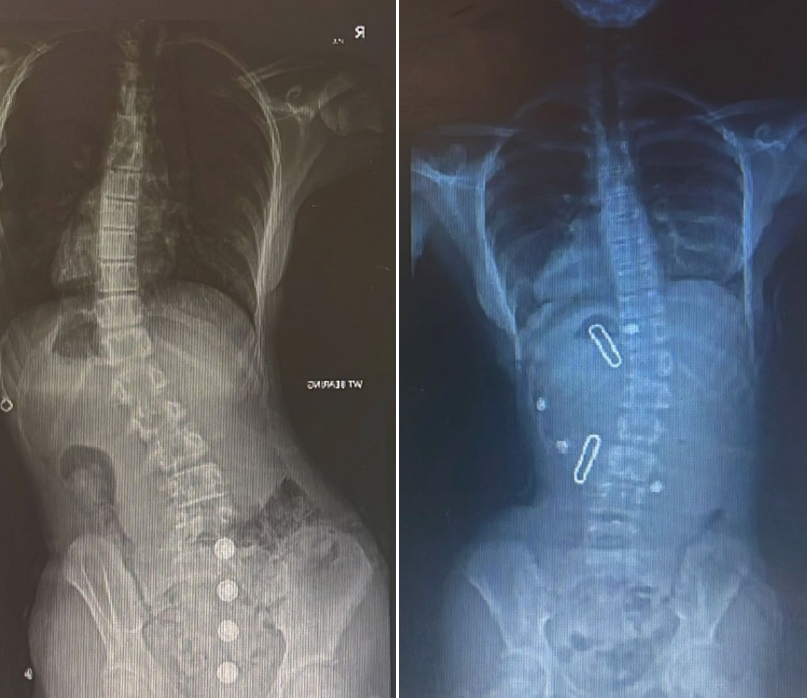
Example 1: Over correction of a curve in a LOC Scoliosis Brace. This patient was then able to reduce the hours of brace wear.
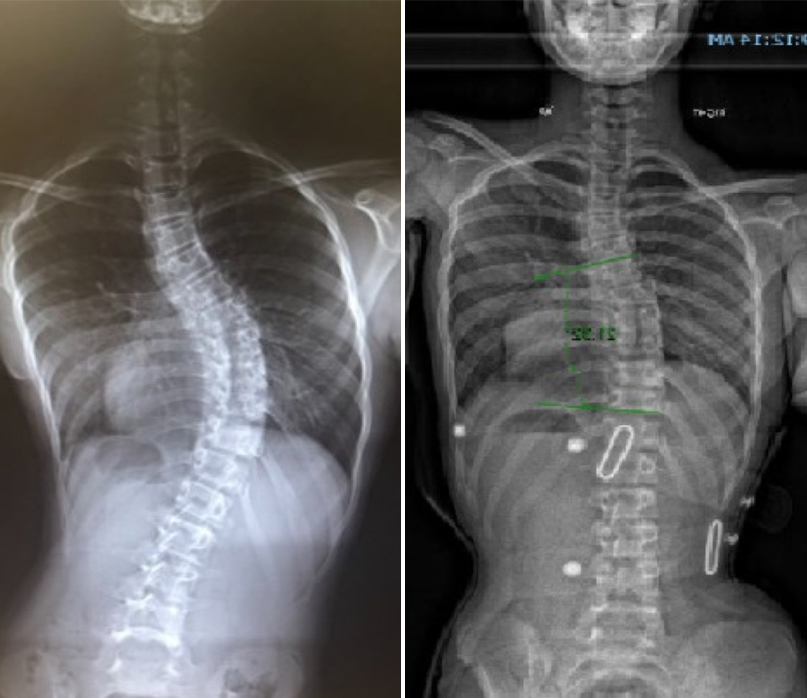
Example 2: 80% in-brace skeletal correction in a LOC Scoliosis Brace.
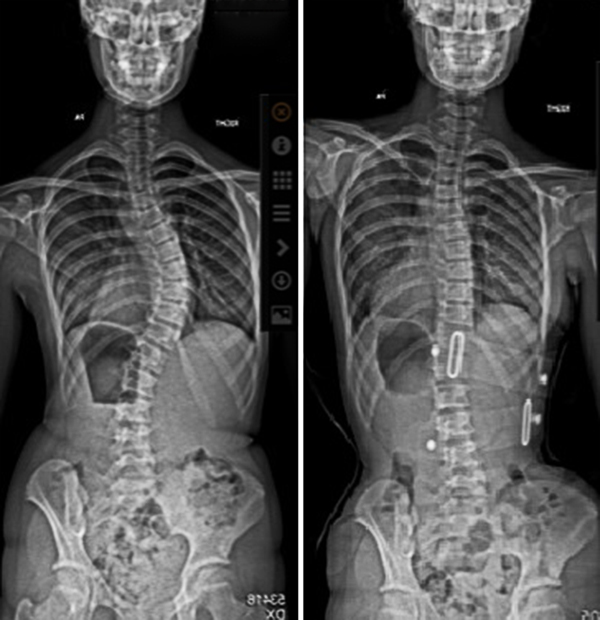
Example 4: A 14-year-old patient with 54 degree Cobb angle prior to treatment. In-brace scan after 5 weeks shows the curve reduced to 14 degrees.
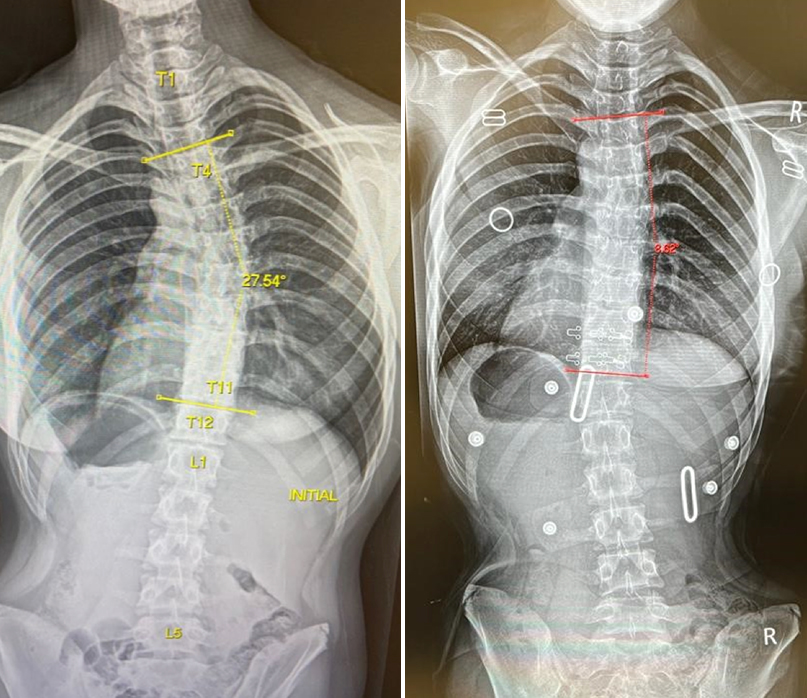
Example 3: Excellent in-brace correction in a LOC Scoliosis Brace.
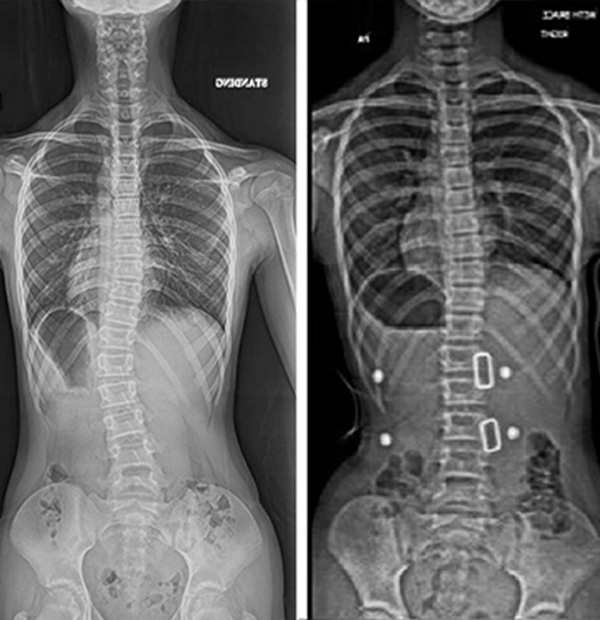
Example 5: A 12-year-old patient with 26 degree Cobb angle prior to treatment. In-brace scan after 7 weeks shows the curve reduced to 5/6 degrees.
According to NHS guidelines, if a curve exceeds 40° then the patient would be advised to have surgery. The operation used to treat severe scoliosis curves is typically a major procedure called spinal fusion surgery. Surgery lasts between 4 to 8 hours depending on the severity of the curve, and a full recovery from the procedure can take from six months up to a year.
As with any major invasive surgery, there are also risks of complications. Spinal surgery can include more serious risks like paraplegia, nerve damage and cerebrospinal fluid leak. Some surgical complications, such as rods breaking or the spine not fusing correctly, can result in the scoliosis continuing to worsen or to return after a number of years.
Our aim is to help any patients who want to avoid surgery to do so. A correctly assessed, designed and fitted 3D brace can stop a scoliosis curve from progressing and prevent the need for surgery.
Surgery can be an effective option for severe cases of scoliosis that have not responded to conservative treatments like bracing. However, it’s not the only solution, and many people with scoliosis can manage their condition successfully with non-surgical interventions.
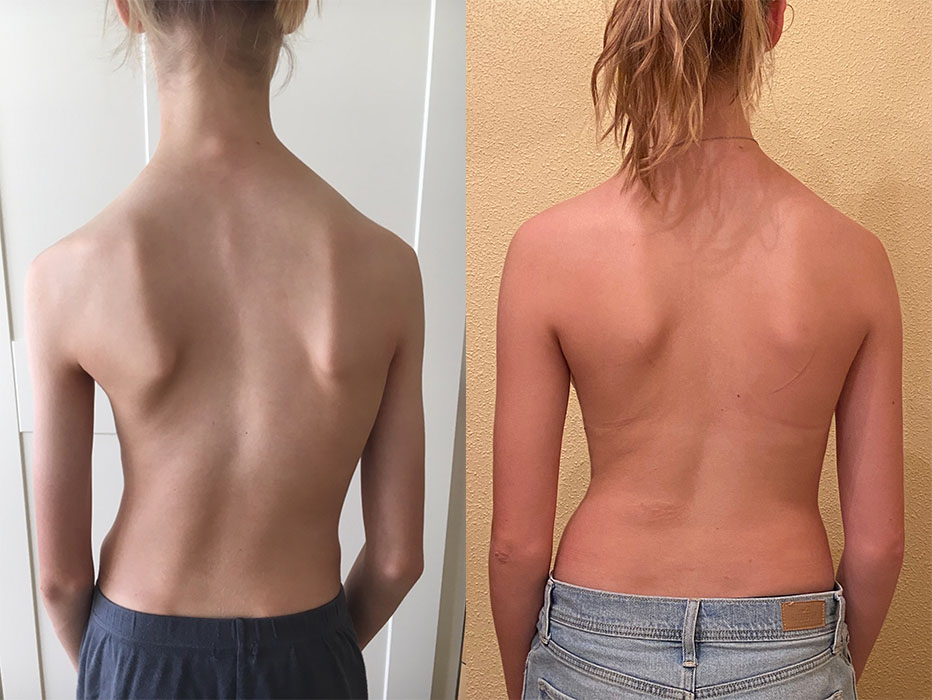
Photos of Sofia's back before and after bracing treatment.
Sofia came to us with a 40-degree Cobb angle before starting bracing treatment. She is an example of one of our patients who has avoided surgery thanks to the LOC Scoliosis Brace.
Due to the three-dimensional focus built within the LOC Scoliosis Brace, we expect to see postural improvements within two months. This should continue to improve with good brace compliance.
This can be in the ‘rib hump’ measure (rotation from the scoliosis), but also in waistline symmetry, shift of the hips and general postural re-balance. If we can ensure that the weight line coming down from the head is more centralised over the pelvis following treatment, the patient’s overall prognosis improves.
Many of our adult scoliosis patients have also enjoyed better posture and reduced rib hump as a result of treatment with the LOC Scoliosis Brace.
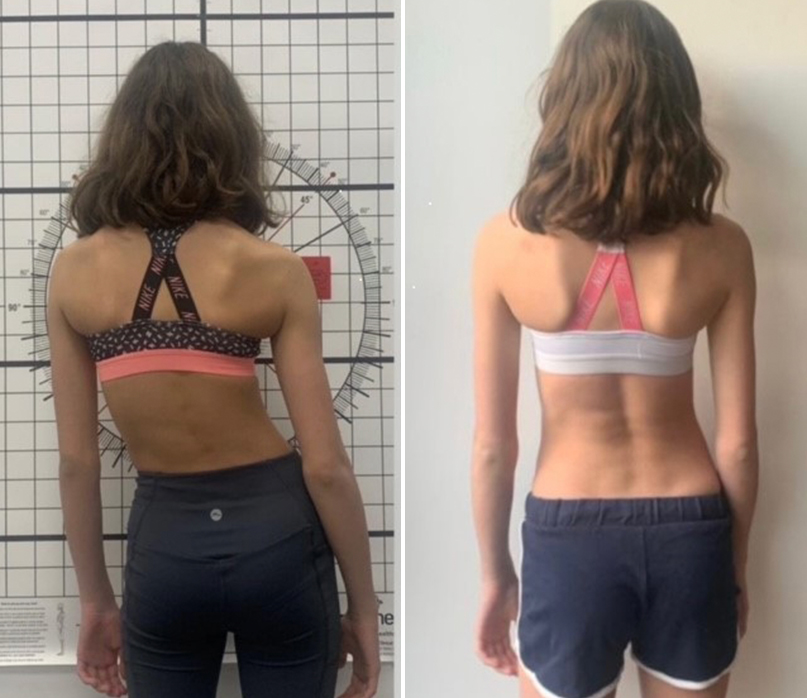
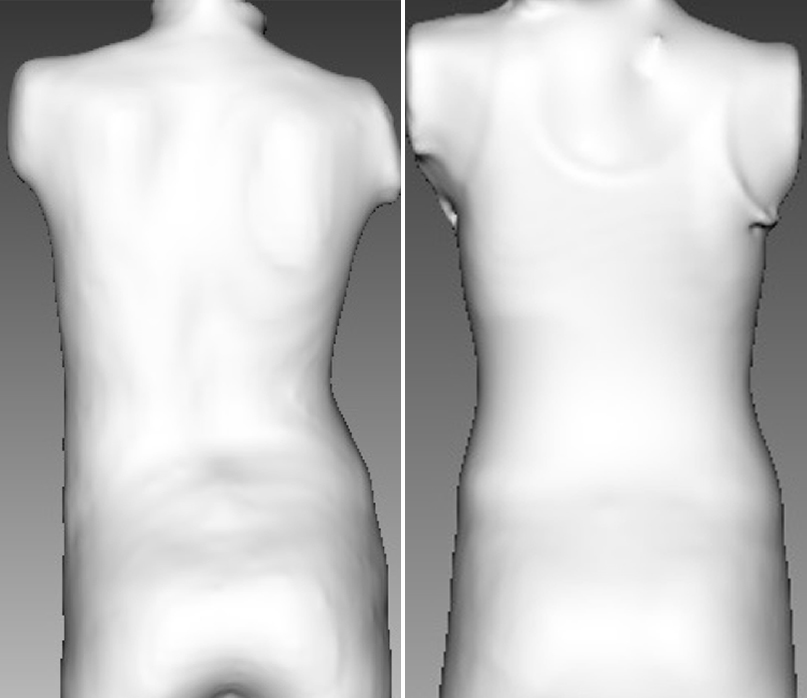
Example 1: Waistline and pelvic correction in an adolescent after only 4 weeks of wearing a LOC Scoliosis Brace. This will continue to improve throughout treatment.
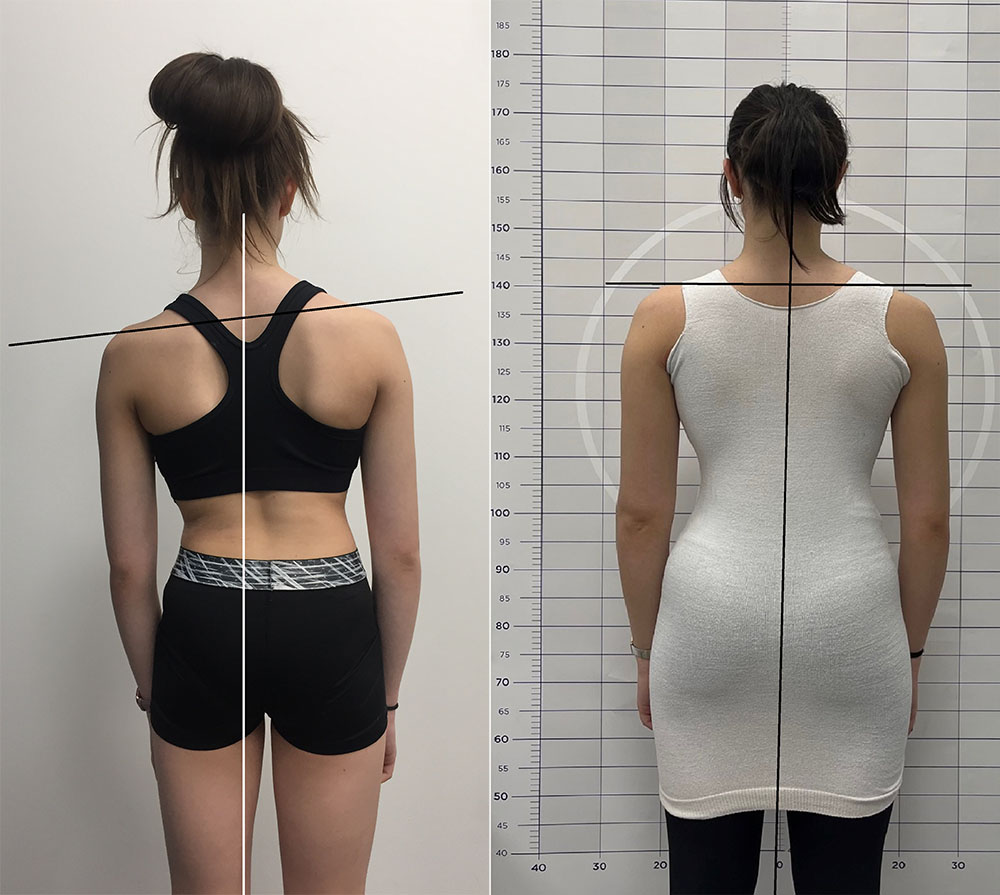
Example 2: Almost perfect posture in young patient nearing the end of treatment which combined bracing with specialist physiotherapy.
The lightweight, low-profile nature of the design offers several benefits:
We refer patients for a rapid low-dose EOS X-ray imaging scan to confirm the efficiency of our braces following the initial fitting. Not only does this mean that the patient is exposed to less radiation but it gives us the ability to generate a 3D reconstructed image to work with and we can scan the entire skeleton in a short space of time.
With traditional braces, this scan is typically performed much later at the two-month mark. Changes are then made to improve the fit of the brace and the correction in the brace.
We have found that a rapid scan gives the clinician a very clear indication as to the correction that will be achieved, whilst ensuring no time is wasted (and therefore correction lost) while waiting for this scan.
See our clinical research paper on On-site clinician-led bracing algorithm with short clinical feedback loops lead to significant improvements in bracing outcomes.
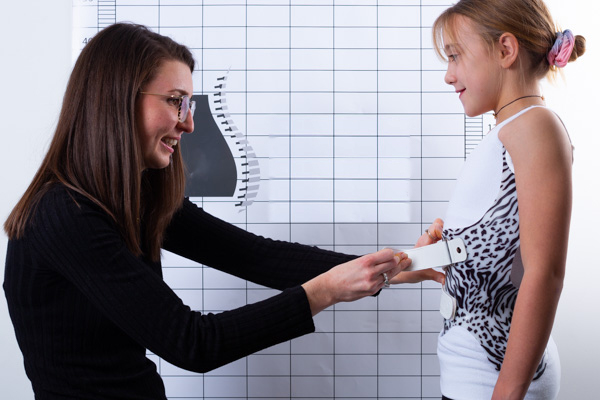
Anna Courtney, Senior Orthotist and Clinical Lead Consultant has been integral to the development of the LOC Scoliosis Brace
Each brace is based on a patient’s 3D scans, which means they are curve-pattern specific and bespoke to each patient.
We create our braces using Computer Aided Design (CAD) and Computer Aided Manufacture (CAM), which means that not only are they smaller and more comfortable than traditional NHS Braces, but we can keep plastic waste down to an absolute minimum.
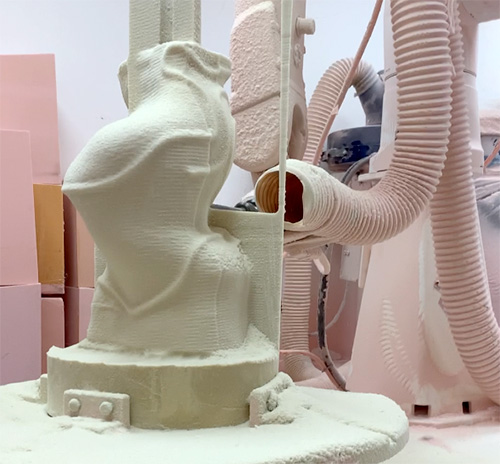
Bespoke Scoliosis brace being milled out by Victor the Robot: Our Rodin 4D Milling Machine
If your orthotist recommends the LOC Scoliosis Brace and you decide to progress with bracing treatment, the appointment schedule is as follows.
During the assessment appointment, a series of scans, photographs and measurements will be taken by one of our scoliosis clinicians. Based on this input, the bespoke LOC Scoliosis Brace is then modelled using CAD/CAM technology and our in-house manufacturing unit then produces the brace.
Please bring a recent out-of-brace x-ray to the appointment with you to the clinic (or discuss this with the clinician beforehand).
As well as our Kingston clinic, we are also able to see scoliosis patients for initial face-to-face assessments at our satellite clinic at Ten Harley Street. (Please note, all follow-up brace fitting appointments must be carried out at our Kingston clinic.)
The brace is then fitted by one of our specialist scoliosis clinicians. This is typically 10 working days following the assessment.
In our Kingston clinic, we offer a same-day scoliosis service whereby a patient can have their measurements taken in the morning before 10am, then fitted in the afternoon. Speak to your clinician if you feel this would be of benefit to you or your child.
We typically like to review a scoliosis brace two weeks after the fitting appointment. This allows us to make tiny adjustments and to ensure the user is settling in well and managing fine at home.
We then plan for the in-brace x-ray and review the correction and adjust the brace as necessary.
Once this has taken place, we monitor each patient's progress with regular review appointments - typically every two to three months.
We welcome communication from parents and patients throughout the treatment with our clinical team. We are then able to quickly respond to make brace adjustments as a patient grows.
Please note that patients under the age of 18 must be accompanied by a parent or legal guardian for all appointments.
The brace is made of hard plastic and has foam pads attached to the pressure points. It is flexible enough to bend slightly and is fastened with Velcro straps at the front.
The LOC Scoliosis Brace distinguishes itself from other braces on the market in several key ways, establishing it as a highly effective and modern solution for scoliosis treatment:
Proven clinical effectiveness:
Clinical findings demonstrate that the LOC Scoliosis Brace achieves an average in-brace correction of 85%, surpassing the effectiveness of other braces, such as Boston braces and other asymmetric braces available in the UK.
Hypercorrective design:
The LOC Scoliosis Brace is a 3D, hypercorrective brace derived from the Cheneau-Gensingen design. Its hypercorrective nature actively reduces the scoliosis curvature three-dimensionally, potentially requiring shorter brace-wearing periods compared to other braces.
Tailored and unique design:
Each LOC Scoliosis Brace is entirely unique and tailored to the patient's spinal curve pattern. This customisation ensures optimal skeletal correction while maintaining comfort, as the brace has been fine-tuned based on feedback from scoliosis patients and spinal consultants.
Risk of progression formulae:
LOC employs a published risk of progression formula, taking into account a patient's age, skeletal age (Risser sign), and the size of the presenting curve. This individualised approach allows the brace to actively reduce the curvature by loading the spinal bones three-dimensionally before growth is completed.
Front-opening mechanism:
Unlike traditional braces, the LOC Scoliosis Brace opens from the front, simplifying the self-application and removal process for patients. This design feature enhances convenience and compliance with the prescribed wear schedule.
Low-profile and lightweight:
The brace is designed to be as low profile as possible, especially under clothing, while still maintaining excellent in-brace correction. Its lightweight nature contributes to increased comfort, compliance, and ease of movement for patients.
Comprehensive treatment approach:
The LOC Scoliosis Brace works in conjunction with Schroth-based physiotherapy to achieve maximum results. It is a full-time brace intended to be worn 22 hours a day, including nighttime, offering a comprehensive approach to scoliosis management.
Reduced plastic use and environmental impact:
The brace is created using Computer Aided Design (CAD) and Computer Aided Manufacture (CAM), allowing for a more tailored design with bespoke three-point pressure systems. This minimises plastic use, resulting in a smaller, more comfortable brace and a reduced environmental impact.
The London Orthotic Consultancy is one of the most experienced private scoliosis clinic in the UK. Not just in terms of clinical outcomes, but manufacturing capabilities and levels of service.
Over the years, we have established ourselves at the very forefront of brace design, correction and comfort. This has led the scoliosis team to be invited to present their work at a number of leading scoliosis conferences worldwide, including The Scoliosis Research Society in Seattle in 2023.
The efficacy of the LOC Scoliosis Brace and high-quality clinical services has led to referrals from specialist consultants across Greater London. This success allows more people to undergo scoliosis treatment with minimal impact on their daily lives.
The success of LOC’s scoliosis treatment package partly lies in the ongoing assessments, ensuring the brace fits well and is adjusted for correction and growth. These appointments, available in-person or via video call, enhance patient motivation and lead to better treatment outcomes.
Maintaining a close relationship between patients and LOC clinicians is crucial for effective scoliosis treatment. Ill-fitting or poorly adjusted braces from other clinics may lead to limited success and increase the risk of unnecessary surgery.
Our experienced orthotists are also backed up by our unrivalled manufacturing team that enables patients to be fitted with their brace within a few weeks or less of their initial assessment. For overseas patients or for the most urgent cases, we can offer (by prior arrangement) a same-day brace fitting service, where a patient is assessed in the morning and their brace is fitted in the evening. This is a unique service in the UK.
Should you have any further questions about the LOC Scoliosis Brace or treatment, we can arrange a free virtual scoliosis assessment with one of our specialist clinicians.
Please send us an e-mail to [email protected] or complete the contact form below to book.
Please note that it is mandatory for children or adolescent patients (under 18) to be accompanied by a parent or legal guardian during all LOC appointments including Zoom, Facetime, and WhatsApp calls. This is to ensure the safety and wellbeing of our patients.
For adolescents with idiopathic scoliosis, time is of the essence when considering treatment options. At a time of rapid skeletal growth, the chances of existing curves getting worse are high.
Because of this, we have introduced a same-day service where our scoliosis patients can be assessed in the morning and have their bespoke brace fitted in the afternoon.
We can provide this service because of the combined expertise of our scoliosis team that can assess, model and manufacture our brace in-house without requiring any outside input. The benefits of this service are being increasingly recognised by spinal consultants in London who understand the time sensitivity of providing corrective treatment for scoliosis if surgery is to be avoided.
Please note: Our same day scoliosis service is only available at our Kingston clinic.

“It’s life-changing, my swimming coach has even remarked what a difference my treatment has made" Read how pectus bracing treatment helped to correct Aris' complex chest deformity, involving a combination of pectus excavatum, pectus carinatum and rib flaring.

Cerebral palsy patient Lucas sees significant improvement in his walking after only six months in his new custom Ankle Foot Orthoses (AFOs), designed by Professor Saeed Forghany in our Manchester clinic. Hear how a detailed gait analysis and bespoke AFOs significantly improved Lucas's gait and comfort.

Freddie’s positional plagiocephaly was treated successfully with the LOCBand Lite, going from 11mm to 2mm after four months in his helmet.

Adult club foot (talipes) patient Natasha says, "I cannot stress how amazing my AFOs are and how they have changed so much for me. The support they give me allows me to walk without crutches outside the house for the first time in over fifteen years."

Diagnosed with adolescent idiopathic scoliosis at 14 years old, Polly and mum Zoe looked to the LOC Scoliosis Brace to help her curve and avoid surgery at a later date.

LOC opens its first clinic in Northern Ireland, LOC Belfast, offer non-surgical orthotic treatment for scoliosis, pectus carinatum and pectus excavatum. Here, we will also be able to provide orthotic treatments for a range of adult and paediatric lower limb conditions including cerebral palsy, spina bifida, hypermobility, stroke, post-polio syndrome, and multiple sclerosis.

Mum Natalie shares her experience of having both her identical twins diagnosed with craniosynostosis. Ella and Nina had surgery at Great Ormond Street Hospital before going through cranial remoulding therapy at the London Orthotic Consultancy.

See how a thorough gait analysis and a correctly-fitted, bespoke Reciprocating Gait Orthosis (RGO) helped Ted, a spinal surgery and cancer survivor, improve his rehabilitation and mobility goals, getting him back on his feet again.